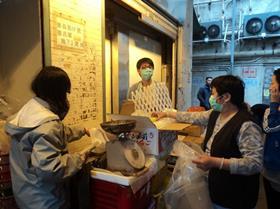
Some fresh produce importers in Hong Kong are seeking to counter the negative impact of the radiation leak on the reputation of Japanese produce through efforts to educate consumers.
Japan has a reputation for producing high-quality fruit such as apples, peaches, melons, grapes and strawberries. While Taiwan remains by far the top export market for such produce, Hong Kong comes in second, and the SAR’s consumers will traditionally pay a premium for Japanese fruit.
Hong Kong importers report that trade has suffered, however, due to the radiation leak from the Fukushima nuclear plant, which has triggered stringent import screening measures and consumers’ food safety concerns.
Hong Kong suspended access for fruit, vegetables and other agricultural produce from certain prefectures of Japan around the nuclear plant on 24 March. Since then, every container of produce imported from Japan has also been registered and checked by the Food and Environmental Hygiene Department (FEHD). The agency takes samples of each product and only releases the consignment to market after the samples have passed the inspection process.
With operations in Hong Kong and China, Top Weal focuses on bringing in fruit and vegetables from Japan, handling around 180 containers annually, but its volumes have plummeted since last month’s devastating earthquake and tsunami.
“We normally import three containers per week from Japan,” said Top Weal’s director Kenneth Lee, “but since the earthquake this has fallen to only one 20ft container per week. Our thoughts are with the victims of the earthquake and tsunami, and we truly hope that Japan and its exports are able to recover from the disaster as soon as possible.”
Decreased demand from the local markets and stringent inspections of receivals by the Hong Kong government have made business more difficult for Top Weal.
“Now that volumes are down, we import mixed containers, and sometimes this means two or three cartons per product,” he told Fruitnet.com. “The checks by the FEHD mean that they have to take at least two cartons for sampling and that leaves us with nothing to sell. It’s difficult to justify this to clients who are sticking their neck out and still requesting Japanese fruit and in the end we are not able to deliver the product.”
The radiation leak has dealt a blow to Hong Kong consumer confidence in the safety of Japanese produce, but Mr Lee is hopeful that confidence will return in two or three months. In the meantime, he said that all importers and retailers can do is try and educate consumers about the situation in a bid to rebuild trust.
To this end, Top Weal is providing its resellers with maps of Japan clearly indicating the areas that have been affected by the earthquake. “Consumers are not aware of the size of Japan and many think that all Japanese produce is contaminated, when in actual fact only certain prefectures have been exposed to radiation,” he said.
Looking to the future for Japanese fruit, Mr Lee predicted that prices of would increase when consumer confidence is restored. Since large areas of fruit and vegetable production were wiped out by the quake and tsunami, he predicted that produce grown in unaffected areas would become more expensive as there would be greater demand for this product to compensate for shortfalls. For example, Fukushima prefecture is renowned for production of its golden peach, which comes online in September, but this year’s crop appears to have been wiped out. The golden peach is a key item for gift-giving in Hong Kong and China during the Moon Festival around September/October, but this year importers will need to find other products to fill the gap.
Already, wholesalers at Hong Kong’s Yau Ma Tei market have been working to develop alternative supply sources to compensate for the downturn in Japanese imports, with Korea and Taiwan being among the main beneficiaries.
Alice Kam of Chee Sang fruit shop at Yau Ma Tei told Fruitnet.com that while Japanese strawberries usually sell for around HK$150-160 per carton, her company has been forced to lower its price to HK$90-100 per carton. Korean strawberries, meanwhile, normally fetch around HK$110-115 per carton, but currently customers are prepared to pay between HK$125-135 per carton, she said.
One positive for Chee Sang is that diversifying its range has resulted in interest from new clients. “Normally, 40 per cent of my sales come from Japanese produce, but now that I have supply from other countries, my shop is attracting different customers,” she said. “I sell Taiwanese cabbage at the moment for a good price and my customers love the product so much that it might become a fixed item in my shop.”



